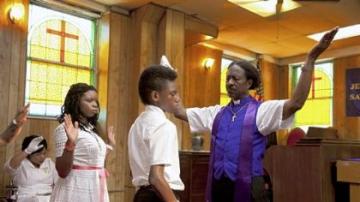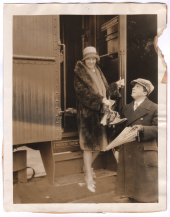Spike Lee's colorful 'Red Hook Summer' falls a bit short
Back in the 1950s, when a million dollars still seemed like a lot of money, producer Sam Spiegel was asked why nobody could make a movie for $1 million any more. His reply: "Because you can't steal $1 million on a $1 million budget!"
The fact that Spike Lee made "Red Hook Summer" for under a mill, in 2012 -- his independent methods cutting out most of the studio system's built-in graft -- is thus amazing in itself. The movie, while perhaps less than amazing, is another unique entry in the canon of America's most important African-American director.
Our protagonist is Flik (Jules Brown), a comfortably middle-class Atlanta boy forced to spend a summer in Brooklyn with the Bible-thumping grandfather he's never previously met. There, in the Red Hook housing projects, grandpa (Clarke Peters) reigns as Bishop Enoch Rouse of the Lil' Peace of Heaven Baptist Church.
Their first meeting is mutually suspicious and inauspicious. "Somebody peed in here," Flik sniffs, upon entering the elevator. Inside the apartment, Enoch offers him "the best fried chicken in Brooklyn." The boy declines with, "I'm vegan."
Glued to his iPad 2 (obsessively recording everything on its camera), Flik and his prior life don't fit into Da Good Bishop's. What lies ahead is a battle of wits and wills: Enoch is determined to engage him directly, rather than virtually, with the people around him -- and with the Lord.
Flik's view of the 21st-century black urban experience, through an iPad, will mirror Spike Lee's through his camera lens, of course -- not stereotypical inner-city slums, full of crime and drug dealers, but normal neighborhoods full of church ladies and good-natured eccentrics. The gang/thug element is present, to be sure, but not predominant. The well-kept Red Hook homes aren't the hopeless hell of "Precious." This Brooklyn is a rough but not homicidal place.
Mr. Lee loves it, and the colorful personalities who inhabit it -- like boozy Deacon Zee (Thomas Jefferson Byrd), who rants and raves about the injustices of life but enjoys his own. There's no shortage of sociopolitical pontification, as always with writer-director Lee, but that agenda gives way here to issues of faith and alienation, innocence and guilt, and the internal joy or suffering of his characters.
Trouble is, the finale is rushed to resolution, as if Mr. Lee can't let his bishop character linger too long in the darkness. The film doesn't show -- merely alludes to -- its most shocking plot point, an incident in Enoch's past, before quickly refocusing on Flik and winding things up. A little more time and effort on the screenplay might have vastly improved the result.
But there's no denying its vitality, or the powerful performance of Clarke Peters (a theater actor, who co-wrote the Tony-nominated "Five Guys Named Moe"). Weak link is 15-year-old newcomer Brown, who has a certain sulky appeal but often sounds as though he's reading off-camera cue cards. On the other hand, budding star Nate Parker (fresh from "Red Tails" and a superb job in the current "Arbitrage") shines as the nasty gangleader.
Spike Lee's extraordinary career began with the early breakout pix "She's Gotta Have It" (1986), "Do the Right Thing" (1989) and "Mo' Better Blues" (1990), ranging through "Malcolm X" (1992), "The Original Kings of Comedy" (2000) and beyond. His Katrina docs "When the Levees Broke" (2006) and the follow-up "If God Is Willing and Da Creek Don't Rise" (2010) suggest he's really a documentarist at heart. Here, he reunites with his "Miracle at St. Anna" (2008) co-screenwriter James McBride. In my humble opinion, "Bamboozled" (2000) was his most brilliant, shattering film.
This one is neither shattering nor brilliant. It's a polemic, but a relatively gentle one -- passionate and heartfelt, with wonderful music enhancing its resonance, from hip-hop to full-blown gospel (thankfully eschewing rap).
Mr. Lee always prefers educating to just entertaining, but he knows the trick is to do both. I don't think he's much interested in teaching white people any more. There was an unwittingly funny line in Variety's review when the film premiered at Sundance in January, wondering about "auds" -- audiences -- for "a pic that calls for strategic specialty handling." Uh, yeah -- that "specialty aud," in the vernacular, is called black folks.
This film is aimed at Mr. Lee's own 'hood. But that's all the more reason why discerning white folks (in both Mitt's and Barack's 47 percent of the wider 'hood) should check it out, as well.






